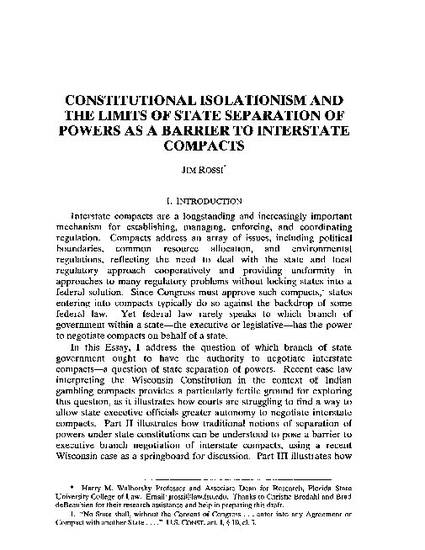
- State constitutions,
- separation of powers,
- federalism,
- preemption,
- Indian gaming
In this Essay, I address the question of which branch of state government ought to have the authority to negotiate interstate compacts - a question of state separation of powers. Recent case law interpreting state constitutions in the context of Indian gambling compacts provides a particularly fertile ground for exploring this question, as it illustrates how courts are struggling to find a way to allow state executive officials greater autonomy to negotiate interstate compacts. Part I illustrates how traditional notions of separation of powers under state constitutions can be understood to pose a barrier to executive branch negotiation of interstate compacts. Part II illustrates how state courts have found this approach unsatisfactory, and discusses how cases have looked to Contract Clause principles to override traditional state separation of powers concerns. I argue that Contract Clause principles are an unsatisfactory way of resolving concerns with the state allocation of powers to negotiate compacts, for both legal and policy reasons. The Essay concludes in Part III by arguing that to date state courts have used an isolationist interpretive method to address the problem. As an alternative I propose that courts interpret the separation of powers provisions of state constitutions in the context of the federal programs states may be furthering when they enter into interstate compacts. Specifically, by drawing on implied preemption principles under the Supremacy Clause of the U.S. Constitution, courts could heed state separation of powers principles in this area without turning separation of powers into a barrier to compacts. Where Congress has indicated some preference for compacts and has authorized states to enter into compacts, I propose a presumption of state executive authority to negotiate compacts on behalf of the state. Where a state legislature has not specifically prohibited the executive from negotiating a compact in a regulatory area, this presumption would authorize the executive to act on behalf of the state subject to disapproval by the state legislature.
Available at: http://works.bepress.com/jim-rossi/8/
